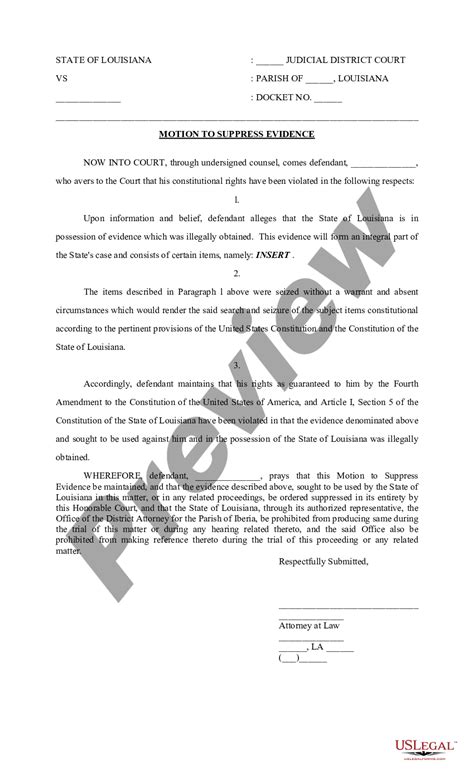How to Expedite Your Motion to Suppress
A motion to suppress evidence is a critical tool in criminal defense. It allows you to challenge the admissibility of evidence obtained illegally or in violation of your constitutional rights. However, the process can be lengthy and complex, potentially delaying your case significantly. Knowing how to expedite your motion to suppress is crucial to protecting your client's rights and achieving the best possible outcome. This article will outline strategies for accelerating the process.
Understanding the Importance of Expediting a Motion to Suppress
The longer a case drags on, the more likely witnesses' memories fade, evidence becomes compromised, and your client's life is disrupted. An expedited motion to suppress can:
- Preserve evidence: Time can affect the integrity of physical evidence, and witnesses’ recollections can become less reliable.
- Reduce pre-trial detention: A speedy resolution can minimize the time your client spends in jail awaiting trial.
- Improve plea bargaining position: A successful motion to suppress can significantly strengthen your negotiating position if you pursue a plea bargain.
- Minimize stress on the client: A quicker resolution reduces the anxiety and uncertainty associated with a prolonged legal process.
Strategies for Expediting Your Motion to Suppress
Several strategies can help expedite the process of getting your motion to suppress heard and decided:
1. Demonstrating Irreparable Harm:
What are the potential consequences of delay? One of the most effective ways to convince the court to prioritize your motion is to clearly demonstrate the potential for irreparable harm to your client if the motion isn't heard promptly. This could include:
- Witness unavailability: Explain how witnesses may become unavailable due to relocation, illness, or death.
- Evidence deterioration: Detail how perishable evidence (e.g., DNA samples, video footage) might degrade over time.
- Prejudice to the defense: Argue how the delay could significantly impair your ability to prepare a robust defense.
2. Filing a Well-Drafted and Concise Motion:
How can clear and concise writing expedite the process? A meticulously crafted motion is essential. Avoid unnecessary legal jargon and focus on clearly stating the facts, legal arguments, and the requested relief. A well-organized, concise motion makes it easier for the court to understand your arguments, leading to a faster review process.
3. Requesting an Expedited Hearing:
How to formally request an expedited hearing. Your motion should explicitly request an expedited hearing. Provide a compelling justification for the request, outlining the potential harm caused by delay. Highlight the urgency of the matter and suggest specific dates for the hearing.
4. Providing All Necessary Evidence Upfront:
Why is complete evidence crucial for efficiency? Include all relevant evidence, including affidavits, police reports, and witness statements, with your initial filing. This minimizes the need for further discovery requests and delays caused by incomplete documentation.
5. Cooperating with the Prosecution:
How can collaboration speed up the process? While vigorously advocating for your client, maintaining a professional and cooperative relationship with the prosecution can sometimes streamline the process. This could involve agreeing on stipulations of fact or jointly proposing a schedule for the hearing. However, this should never compromise your client's best interests.
6. Understanding Local Court Rules and Procedures:
How are local rules relevant to expediency? Familiarize yourself with your jurisdiction's rules regarding motions to suppress and expedited hearings. Some courts have specific procedures or deadlines that you must follow. Understanding these rules will help you navigate the process efficiently.
7. Employing Effective Legal Strategies:
What legal strategies can impact the speed of the process? The specific legal arguments you make in your motion will influence the court’s response. Strong legal arguments based on established precedent can significantly increase the chances of an expedited hearing and a favorable ruling.
Frequently Asked Questions (FAQs)
Can I expedite a motion to suppress even if my case involves complex issues? Yes, but you’ll need to present a stronger argument for expedited consideration, emphasizing the specific harm that delay would cause even in complex cases.
What happens if the court denies my request for an expedited hearing? If the court denies your request, you should consider appealing the decision, especially if irreparable harm is likely. You may also need to re-strategize, potentially focusing on other aspects of the case to minimize the impact of the delay.
What if the prosecution opposes my motion to expedite? Be prepared to present a compelling counter-argument demonstrating why the court should prioritize your motion despite the prosecution's opposition. Your ability to highlight the specific harm caused by delay will be crucial.
What should I do if new evidence emerges after filing the motion? You can file a supplemental motion to include the new evidence. Explain why this new information strengthens your argument for expedited consideration.
Successfully expediting a motion to suppress requires careful planning, strong legal arguments, and a proactive approach. By implementing these strategies and understanding local court procedures, you can significantly increase your chances of a speedy and favorable resolution, protecting your client's rights and interests. Remember, consulting with experienced legal counsel is essential to effectively navigate the complexities of this process.

